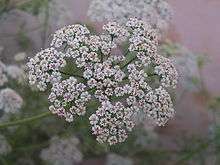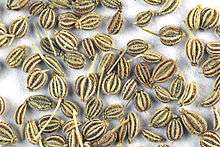Ajwain
| Ajwain | |
|---|---|
 | |
| Flowers of Trachyspermum ammi | |
| Scientific classification | |
| Kingdom: | Plantae |
| Clade: | Angiosperms |
| Clade: | Eudicots |
| Clade: | Asterids |
| Order: | Apiales |
| Family: | Apiaceae |
| Genus: | Trachyspermum |
| Species: | T. ammi |
| Binomial name | |
| Trachyspermum ammi | |
| Synonyms[1][2] | |
Ajwain, ajowan[3] (/ˈædʒəwɒn/), or Trachyspermum ammi—also known as ajowan caraway, bishop's weed,[4] or carom—is an annual herb in the family Apiaceae (or Umbelliferae). It originated in India. Both the leaves and the seed‑like fruit (often mistakenly called seeds) of the plant are consumed by humans. The name "bishop's weed" also is a common name for other plants. The "seed" (i.e., the fruit) is often confused with lovage "seed".[5]
Description

Ajwain's small, oval-shaped, seed-like fruits are pale brown schizocarps, which resemble the seeds of other plants in the Apiaceae family such as caraway, cumin and fennel. They have a bitter and pungent taste, with a flavor similar to anise and oregano. They smell almost exactly like thyme because they also contain thymol, but they are more aromatic and less subtle in taste, as well as being somewhat bitter and pungent. Even a small number of fruits tends to dominate the flavor of a dish.[5]
Cultivation and production
The plant is mainly cultivated in Iran and India.[5] Rajasthan produced about 55% of India's total output in 2006.[6]
Culinary uses
The fruits are rarely eaten raw; they are commonly dry-roasted or fried in ghee (clarified butter). This allows the spice to develop a more subtle and complex aroma. In Indian cuisine, it is often part of a chaunk, a mixture of spices fried in oil or butter, which is used to flavor lentil dishes. It is widely used in Pakistani cuisine as well and it is also an important ingredient for herbal medicine practiced there. In Afghanistan, the fruits are sprinkled over bread and biscuits.[7]
The leaves of the Indian Borage are also called ajwain leaves and the plant itself is also sometimes called the ajwain plant; the leaves are used to make popular dishes such as chutneys and pakoras.
However it is not to be confused with the plant that is used for its fruits, whose leaves may or may not be edible.
Uses in traditional medicine
Ajwain is used in traditional Ayurveda primarily for stomach disorders such as indigestion, bloating, fatigue, abdominal pain, flatulence,[5] diarrhea, and colic.[8] along with respiratory distress and loss of appetite.[9] In Siddha medicine, the crushed fruits are applied externally as a poultice.[10]
Essential oil
Hydrodistillation of ajwain fruits yields an essential oil consisting primarily of thymol, gamma-terpinene, p-cymene, and more than 20 trace compounds which are predominantly terpenoids.[11]
References
- ↑ "Trachyspermum ammi". Germplasm Resources Information Network (GRIN). Agricultural Research Service (ARS), United States Department of Agriculture (USDA). Retrieved 11 December 2017.
- ↑ ITIS entry for Trachyspermum ammi
- ↑ "ajowan - Definition of ajowan in English by Oxford Dictionaries". Oxford Dictionaries - English.
- ↑ "Bishop's Weed". SPICES BOARD INDIA. Archived from the original on 14 October 1999. Retrieved 14 August 2015.
- 1 2 3 4 Aliza Green (January 2006). Field Guide to Herbs & Spices: How to Identify, Select, and Use Virtually Every Seasoning at the Market. Quirk Books. pp. 116–117. ISBN 978-1-59474-082-4.
- ↑ Rajasthan Gov, Commissionerate of Agriculture.
- ↑ Alan Davidson (2014). The Oxford Companion to Food. Oxford University Press. pp. 9–. ISBN 978-0-19-967733-7.
- ↑ 1929-, Duke, James A., (2002). Handbook of medicinal herbs. Duke, James A., 1929- (2nd ed.). Boca Raton, FL: CRC Press. ISBN 0849312841. OCLC 48876592.
- ↑ Template:Cite journal pmid = 25089273
- ↑ Bairwa, Ranjan; Rajawat, BS; Sodha, RS (2012). "Trachyspermum ammi". Pharmacognosy Reviews. 6 (11): 56. doi:10.4103/0973-7847.95871. PMID 22654405.
- ↑ Singh, Gurdip; Maurya, Sumitra; Catalan, C.; de Lampasona, M. P. (June 2004). "Chemical Constituents, Antifungal and Antioxidative Effects of Ajwain Essential Oil and Its Acetone Extract". Journal of Agricultural and Food Chemistry. 52 (11): 3292–3296. doi:10.1021/jf035211c. PMID 15161185.
External links
- Ajwain from The Encyclopedia of Spices